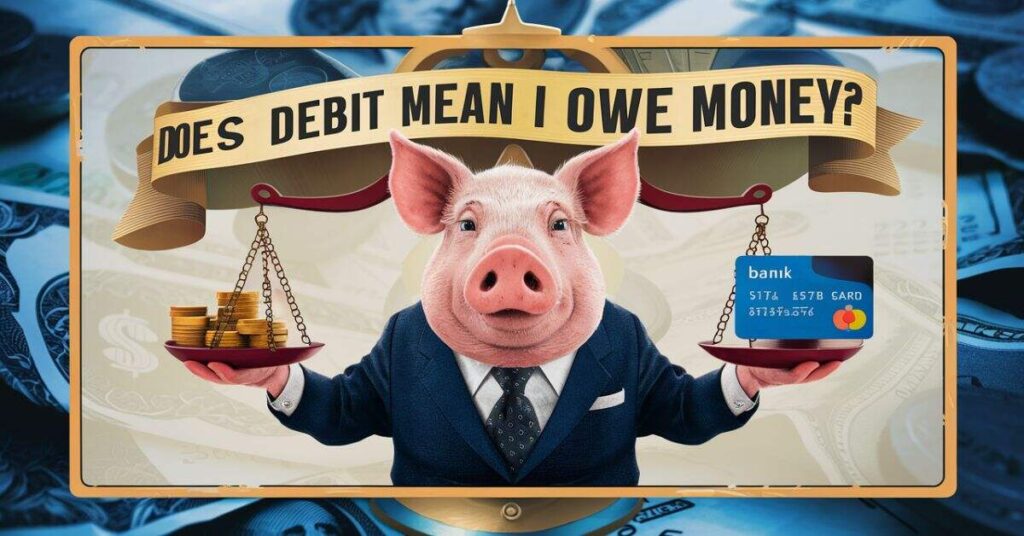Ever glanced at your bank statement and felt a jolt of panic when you saw the word “debit”? You’re not alone. Many Americans grapple with this financial term, often wondering, “Does debit mean I owe money?” Let’s dive into this fiscal enigma and clear the air once and for all. Does debit mean I owe money?
In Debit Meaning: You owe, but don’t have to pay. Find out Why.
Here’s a head-scratcher for you: being in debit can mean you owe money, but it doesn’t always mean you need to pay up. Sounds confusing, right? Don’t worry, we’ll break it down for you in this comprehensive guide.
Key Takeaways
Before we dive deep, let’s skim the surface with some key points:
- Debit doesn’t always mean you owe money
- The meaning of “debit” can vary depending on the context
- Being in debit can affect your finances, but not always negatively
- Understanding debit is crucial for managing your money effectively
What Does In Debit Mean?
In the world of finance, “debit” is like a chameleon, changing its meaning based on its surroundings. At its core, a debit represents an entry in financial records. It’s the left side of the accounting equation, balancing out credits on the right. Does debit mean I owe money?
“In accounting, debits and credits are beautiful things.” – Warren Buffett
But here’s where it gets tricky. In your personal bank account, a debit often means money leaving your account. Yet, for a company’s accounts receivable, a debit could mean money coming in. Confused yet? Let’s break it down further.
What other Accounts Use ‘In Debit’?
Debit isn’t just a banking term. It pops up in various financial contexts:
Bank Accounts
In your checking account, a debit typically means a withdrawal. You’re reducing your balance.
Credit Card Accounts
Oddly enough, a debit on your credit card statement means you’ve made a payment. You’re reducing what you owe.
Related Post: Does debit mean I owe money?
Merchant Accounts
For businesses, a debit in their merchant account often means they’re receiving money from sales.
Trading and Investment Accounts
In these accounts, a debit could mean you’re buying securities or withdrawing funds.
Overdraft Accounts
A debit account here means you’ve spent more than your available balance.
Expense Accounts
For businesses, debits in expense accounts show money spent on operations.
Loans and Debts
A debit here often means you’ve made a payment, reducing your debt.
Reasons for Being In Debit

Now, let’s talk about why you might find yourself “in debit.” It’s not always a bad thing! Here are some common scenarios:
- Prepaid services: You’ve paid in advance, so you’re “in credit” with the company.
- Overpayments: You’ve paid more than necessary, creating a positive balance.
- Refunds: A company owes you money due to returns or billing errors.
- Account errors: Sometimes, it’s just a mistake that needs correcting.
Impact on Your Finances and Credit Score
Being in debit can affect your financial health, but not always negatively. Here’s a quick rundown:
| Scenario | Impact on Finances | Impact on Credit Score |
|---|---|---|
| Prepaid services | Positive: You’ve budgeted ahead | Neutral |
| Overpayments | Neutral: Money tied up, but not lost | Neutral |
| Refunds Due | Positive: Extra money coming your way | Neutral |
| Account Errors | Varies: Could be positive or negative | Potentially negative if not resolved |
Managing Your Energy Account in Debit
Energy accounts often use the term “in debit” when you’ve used less energy than you’ve paid for. It’s like having store credit with your utility company. Here’s how to manage it:
- Monitor your usage: Keep track of your energy consumption.
- Understand your billing cycle: Know when readings are taken and bills are issued.
- Adjust your payments: If you’re consistently in debit, consider reducing your monthly payments.
Requesting a Refund
If you’re in debit with a company, you might be entitled to a refund. Here’s how to go about it:
- Check your balance: Confirm you’re actually in debit.
- Contact the company: Reach out to customer service.
- Provide evidence: Have your account details and statements ready.
- Know your rights: In the US, companies are generally required to refund overpayments.
Switching Energy Suppliers
Thinking of switching while in debit? Here’s what you need to know:
- Your debit balance typically transfers to your new supplier
- Some suppliers offer incentives to switch, even if you’re in debit
- Always compare offers from multiple suppliers before making a decision
Tips for Effective Energy Bill Management
Stay on top of your energy bills with these pro tips:
- Use a smart meter: Get real-time data on your energy usage.
- Conduct an energy audit: Identify areas where you can save.
- Insulate your home: Reduce energy waste and lower your bills.
- Consider renewable energy: Solar panels could put you permanently in debit (in a good way!). Does debit mean I owe money?
Additional Support for Energy Bill Payments
If you’re struggling with energy bills, help is available:
- LIHEAP: The Low Income Home Energy Assistance Program offers support to qualifying households.
- Weatherization Assistance Program: Get help making your home more energy-efficient.
- Utility company programs: Many providers offer assistance to low-income customers.
The Importance of Energy Consumption Awareness
Being energy-conscious isn’t just good for your wallet—it’s great for the planet too. Here’s why it matters:
- Lower bills: The less energy you use, the less you pay.
- Environmental impact: Reduced energy consumption means lower carbon emissions.
- Grid stability: Efficient energy use helps prevent blackouts and brownouts.
Why Don’t You Have To Pay When In Debit?
Here’s the kicker: when you’re in debit with a utility company, you don’t have to pay because you’ve already paid! It’s like having a gift card balance. You’ve given the company more money than you’ve used in services. Does debit mean I owe money?
Final Thoughts: Most of us are In Debit
Believe it or not, being in debit is pretty common. From prepaid phone plans to energy accounts, many of us are “in debit” somewhere. The key is understanding what it means in each context and managing it effectively.
FAQs
Q: Does debit mean what I owe?
A: Not always. In some contexts, it can mean you’ve overpaid or have credit with a company.
Q: Do you owe money with a debit?
A: It depends on the context. In a bank account, a debit reduces your balance. In an energy account, being in debit often means the company owes you.
Q: What does it mean when my account is in debit?
A: In most cases, it means your account balance is negative. However, with utility companies, it often means you’ve paid more than you’ve used.
Q: Is owing a credit or debit?
A: Owing money is typically represented as a credit in accounting terms. However, in everyday language, people often say they’re “in debit” when they owe money.





